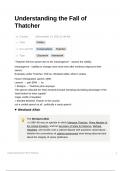Understanding the Fall of
Thatcher
Created @November 13, 2022 11:48 AM
Topic Politics
Gov and PM Conservatives Thatcher
Type Classwork Homework
“Thatcher fell from power due to her intransigence” - assess the validity
Intransigence - inability to change ones mind even after evidence disproves their
stance.
Examples under Thatcher: Poll tax, Westland affair, Miner’s strikes
Howe’s Resignation speech 1990:
Lawson → part ERM → no
= Resigns → Thatcher joins anyways
The speech ridiculed her fears towards Europe stomping and taking advantage of her
’bats broken by team captain’
’tragic conflic of loyalties’
= decided between Thatcer or the country
not a cordial speech at all , politically a nasty speech
Westland Affair
💡 The Westland affair
in 1985–86 was an episode in which Margaret Thatcher, Prime Minister of
the United Kingdom, and her Secretary of State for Defence, Michael
Heseltine, went public over a cabinet dispute with questions raised about
whether the conventions of cabinet government were being observed and
about the integrity of senior politicians.
Understanding the Fall of Thatcher 1
, The argument was over the future of Westland Helicopters, Britain's last helicopter
manufacturer, which was to be the subject of a rescue bid. The Defence Secretary,
Heseltine, favoured a European solution, integrating Westland with a consortium
including British Aerospace (BAe), Italian and French companies. Thatcher and
Trade and Industry Secretary Leon Brittan, while ostensibly maintaining a neutral
stance, wanted to see Westland merge with Sikorsky, an American company.
Heseltine refused to accept Thatcher's choice and claimed that Thatcher had
refused to allow a free ministerial discussion of the matter, even suggesting that she
had lied about cancelling a scheduled meeting. In January 1986, when he was
ordered to cease campaigning for his European consortium, he resigned and walked
out of a Cabinet meeting.
Thatcher's survival as Prime Minister briefly appeared in
question, but she rode out the crisis. The episode nonetheless
was an embarrassment to the Conservative Thatcher
government and undermined her reputation.
Retirement of Whitelaw
He formally resigned as Deputy Leader of the Conservative
Party in 1991; a farewell dinner was held in his honour on 7
August 1991. After several years of declining health, Whitelaw
died from natural causes at Ennim, his home in Blencow, on 1
July 1999, shortly after his 81st birthday.
- Following Thatcher's victory in 1979, he assumed the Great Office of Home
Secretary, although Deputy Leader of the Party was scrapped as an official title and
he instead became the de facto Deputy Prime Minister, although he never officially
held that title.
- He was seen as someone who would be a natural opponent within of Thatcher but
he would be one of her staunchest defenders in government in her first
administration, in 'The Downing Street Years'.
- During his time as Home Secretary, he was seen to be one of the most hardline of
his time, although a 1978 TV interview given by Thatcher on cutting immigration due
Understanding the Fall of Thatcher 2




